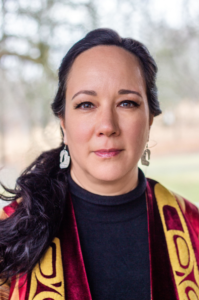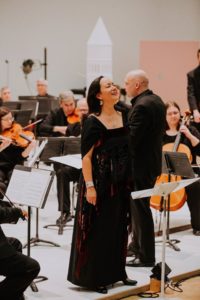A letter from our Executive Director, Katherine Carleton
Dear members,
In the last four weeks a wave of cancellations has spread across the country in the wake of lockdown measures to contain the spread of COVID-19. Every one of our approximately 130 member orchestras has been affected.
It has been nothing short of inspirational to see the adaptability of Canadian orchestras who are now creating more online content than ever. Orchestras Canada has also increased our level of online activity to support our members going through these unprecedented challenges. We know that orchestras are stronger together than they are alone, and we have been expanding and adapting our four mission pillars to help orchestras respond to the current crisis.
Convening
 Over the last month OC has convened online meetings with a number of stakeholder groups to exchange information, ideas and to design collective responses to the current shutdown. We have held meetings with orchestra CEOs, youth orchestra leaders, personnel managers, and with groups of marketing and education staff. We’re making plans to continue and expand these meetings. Let us know what you need.
Over the last month OC has convened online meetings with a number of stakeholder groups to exchange information, ideas and to design collective responses to the current shutdown. We have held meetings with orchestra CEOs, youth orchestra leaders, personnel managers, and with groups of marketing and education staff. We’re making plans to continue and expand these meetings. Let us know what you need.
Advocacy
 Our advocacy committee has been hard at work assessing the best way to approach federal government decision-makers and make them aware of orchestras’ needs. We’ve written a letter to several government ministers, and are encouraging our members to share the letter with their local MPs. For obvious reasons, we’ve focused on emergency short term measures. We’ll continue this, even as we consult with you to develop re-launch and resilience strategies for Canadian orchestras.
Our advocacy committee has been hard at work assessing the best way to approach federal government decision-makers and make them aware of orchestras’ needs. We’ve written a letter to several government ministers, and are encouraging our members to share the letter with their local MPs. For obvious reasons, we’ve focused on emergency short term measures. We’ll continue this, even as we consult with you to develop re-launch and resilience strategies for Canadian orchestras.
Knowledge-sharing
We are issuing frequent updates to our members with news that directly affects the arts sector, as well as resources and tools to equip you to respond to the current situation. We’re also happy to share your initiatives and triumphs. You can read these updates on our COVID-19 page, or by signing up to our email list.
Research
 So far we have run two surveys that have measured the immediate impact of the COVID-19 shutdowns on our members, and have reported back with some initial insights from our statistician, Steve Smith. This data collection is an ongoing process: while we’re aware that you’re being approached we’ll be collecting and analyzing further data.
So far we have run two surveys that have measured the immediate impact of the COVID-19 shutdowns on our members, and have reported back with some initial insights from our statistician, Steve Smith. This data collection is an ongoing process: while we’re aware that you’re being approached we’ll be collecting and analyzing further data.
I encourage you to take a look at what we’ve been up to, and encourage you to get in touch with us to share resources, brainstorm ideas, or just to check in. Take care,
Katherine Carleton C.M.
Executive Director
Orchestras Canada/Orchestres Canada

 Jeff Alexander is the President of the Chicago Symphony Orchestra Association. He has overseen the activities of the orchestra’s 125th anniversary season; worked in support of the wide range of education and community engagement program; supported and represented the organization on multiple domestic and international tours; and led a process to develop a new strategic plan for the Association. Prior to his work at the CSO, Alexander worked in senior management roles at the Vancouver Symphony Orchestra and the Cincinnati Symphony Orchestra. He is a former board president of Orchestras Canada.
Jeff Alexander is the President of the Chicago Symphony Orchestra Association. He has overseen the activities of the orchestra’s 125th anniversary season; worked in support of the wide range of education and community engagement program; supported and represented the organization on multiple domestic and international tours; and led a process to develop a new strategic plan for the Association. Prior to his work at the CSO, Alexander worked in senior management roles at the Vancouver Symphony Orchestra and the Cincinnati Symphony Orchestra. He is a former board president of Orchestras Canada. Dale Hedding is the Vice-President of Development at the Chicago Symphony Orchestra. A passionate advocate for arts that inspire, he brings to the organization more than 25 years of leadership experience in arts, culture and education institutions, including successful tenures at the Arts Consulting Group, Baltimore Symphony Orchestra, Atlanta Symphony Orchestra, and the John F. Kennedy Center for the Performing Arts.
Dale Hedding is the Vice-President of Development at the Chicago Symphony Orchestra. A passionate advocate for arts that inspire, he brings to the organization more than 25 years of leadership experience in arts, culture and education institutions, including successful tenures at the Arts Consulting Group, Baltimore Symphony Orchestra, Atlanta Symphony Orchestra, and the John F. Kennedy Center for the Performing Arts. Ryan Lewis is the Vice-President of Marketing and Sales at the Chicago Symphony Orchestra, serving there as a member of the senior management team and leading a department that is responsible for marketing, communications and design, digital content and web technologies, as well as ticketing and patron services. Prior to his current role at the CSO, he held positions with Opera Philadelphia, the John F. Kennedy Center for Performing Arts and Washington National Opera.
Ryan Lewis is the Vice-President of Marketing and Sales at the Chicago Symphony Orchestra, serving there as a member of the senior management team and leading a department that is responsible for marketing, communications and design, digital content and web technologies, as well as ticketing and patron services. Prior to his current role at the CSO, he held positions with Opera Philadelphia, the John F. Kennedy Center for Performing Arts and Washington National Opera.

 The first project the IAC consulted on was the newly created Forward Currents Festival. “Each year the festival focuses on an issue that is socially relevant to our community here in Regina”, says Gordon. The first edition in 2018 focused on Truth and Reconciliation, and the 2019 edition focused on mental health awareness.
The first project the IAC consulted on was the newly created Forward Currents Festival. “Each year the festival focuses on an issue that is socially relevant to our community here in Regina”, says Gordon. The first edition in 2018 focused on Truth and Reconciliation, and the 2019 edition focused on mental health awareness.